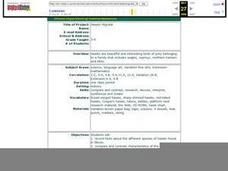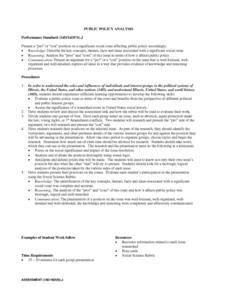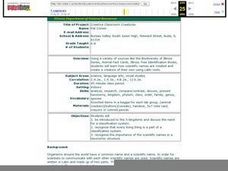Curated OER
ENTICEing Fun with Illinois Facts
Students participate in a multi-grade scavenger hunt. Using fun-fact cards, they answer questions based on Illinois. They record their answers in a journal and discuss any items they are unclear on.
Curated OER
Aquatic Exotics
Students identify and describe the aquatic exotic species found in Illinois. Using the internet, they research the species origins and discover their effects on native species in the area. They discuss how appropriate it is to introduce...
PBS
Evaluating Conflicting Evidence: Sultana
What sunk the Sultana? Scholars become investigators to uncover the facts behind the 1865 sinking just after the end of the Civil War. Through group work, videos, and primary documents, they research and analyze why 1,800 men died....
Curated OER
Biodiversity in Illinois-Pond Habitats
Second graders construct a pond habitat in the classroom using a small swimming pool partially filled with water, real cattails, a tree log adjoining, and plastic animal life appropriate to a pond setting. They examine the frog in detail...
Curated OER
Using Literature to Introduce the Five Themes of Geography
Students listen to a read aloud of "If You Grew Up With Abraham Lincoln". Using the text, they identify examples of the five themes of geography and write them down. Using a map, they plot the places mentioned in the book and sort facts...
Curated OER
Volcanoes:How Safe Are They?
Students explore volcanoes, locate them on maps, record general information about volcanoes, and organize information on a fact sheet.
Curated OER
Reservoir Activity
Young scholars research the economic importance of the major reservoirs in Illinois. In groups, they manage a budget for one of the lakes to promote tourism in the area. They also work together to create advertisements.
Curated OER
Amazing Bird Adaptions--Why Am I A Bird?
Fourth graders identify and classify birds found in Illinois. Using the internet, they discover how birds have adapted over time and how the adaptations have increased their life span. They compare and contrast the various adaptations...
Curated OER
Hawks Migrate
Students examine the types of hawks found in Illinois and compile a list of them. Using different species of hawks, they compare and contrast their characteristics. They work together to create their own hawk model for the classroom.
Curated OER
Public Policy Analysis
Students read an article about a pressing public policy issue. Using the text, they identify the themes, facts and ideas presented and develop an argument supporting or disagreeing with the position of the author. In groups, they...
Curated OER
Creative Classroom Creatures
Students are introduced to the five kingdoms and discover why there is a need for a classification system. Using the internet, they examine how scientific names are created and practice putting animals into their correct classification....
Curated OER
Museum Adventure WebQuest
Students discover the background and properties of minerals. They examine fluorite and record data after testing it. They use the internet to help them discover information about minerals.
Curated OER
How to "Read" an Artifact
Pupils discuss the types of information they can get from artifacts. In groups, they practice "reading" artifacts and determining their usage. They use inferences to test against official information about certain pieces. They also...
Curated OER
Here a Bug, There a Bug
Students explore insects and discover that insects found in different parts of the country have characteristics that can be observed and described.
Curated OER
Langston Hughes: Artist and Historian
Students examine the life and works of Langston Hughes. In groups, they research the characteristics of the Harlem Renaissance and how Hughes' poems relate to the era. They use the themes in his writings and relate it to the Great...
Curated OER
What's Down There
Third graders gather and examine samples from the school outdoor environment. They compare/contrast their samples with those of other students. Students record the results of their observations.















